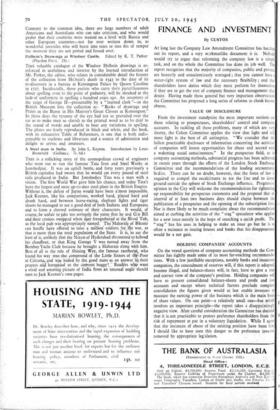FINANCE AND INV ESTMENT
By CUSTOS
AT. long last the Company Law Amendment Committee has hatched out its report, and a very workmanlike document it is. Nobody would try to argue that reforming the company law is a simple task, and on the whole the Committee has done its job well. The report recognises that the majority of companies, public and private, are honestly and conscientiously managed ; that you cannot have a water-tight system of law and the necessary flexibility ; and that shareholders have duties which they must perform for themselves if they are to get the sort of company finance and management they desire. Having made those general but very important. observations the Committee has proposed a long series of reforms to check known abuses.
VALUE OF DISCLOSURE
From the investment standpoint the most important sections are those relating to prospectuses, shareholders' control' and company accounts. In tackling all these problems, many of which are very thorny, the Cohen Committee applies the view that light and still more light is the best of all antiseptics. " We consider that the fullest practicable disclosure of information concerning the activities of companies will lessen opportunities for abuse and accord with a wakening social consciousness." In the prospectus field, as in company accounting methods, substantial progress has been .achieved in recent years through the efforts of the London Stock Exchange Committee and the recommendations of the leading accountancy bodies. :There can be no doubt, however, that the force of law is required to compel the recalcitrants to toe the line and to *Cover ground outside the sphere of Stock Exchange influence. Progressive opinion in the City will welcome the recommendations for tightening up responsibility for prospectus statements and the proposal that an interval of at least two business days should' elapse between the publication of a prospectus and the opening of the subscription lists. Nor is there likely to be much complaint about the recommendation aimed at curbing the activities of the " stag" speculator who applies for a new issue merely in the hope of snatching a Quick profit. The " stag " has his uses in helping to make an issue go but he is so often a nuisance to issuing houses and banks that his disappearance would be a net gain.
•• ' HOLDING COMPANIES' ACCOUNTS
On the vexed questions of company accounting methods the Com- mittee has rightly made some of its most far-reaching recommenda- tions. With a few justifiable exceptions, notably banks and insurance companies, the concealment of reserves will, if this report, is.adopted, become illegal, and balance-sheets will, in fact, have to give a true and correct view of the company's position. Holding companies will have to present consolidated balance-sheets and profit and loss accounts and except where technical factois preclude complete consolidation the figures given would at last enable investors to measure the earning power of the business which is the main basis of share values. On one point—a relatively small one—but which involves an important principle—the report takes a disappointingly negative view. After careful consideration the Committee has decided that it is not practicable to protect preference shareholders from the risk of repayment at par in a. voluntary jiquklation. While I agree that the instances of abuse of the existing position have been few, I should like to have seen this danger to the preference investor removed by appropriate legislation.


























 Previous page
Previous page